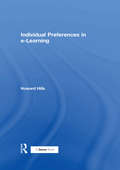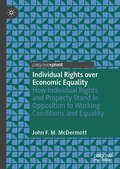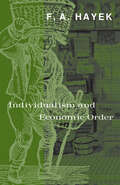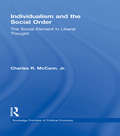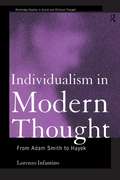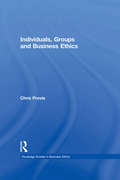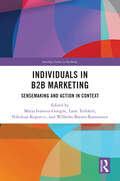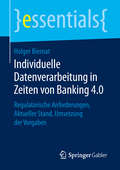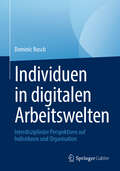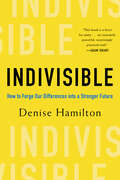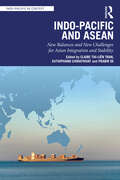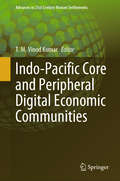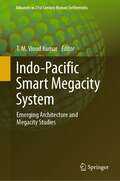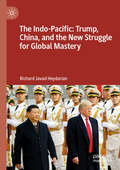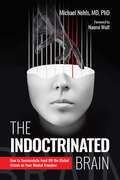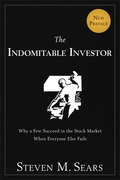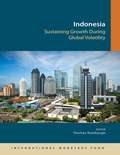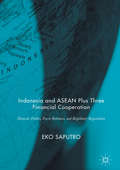- Table View
- List View
Individual Preferences in e-Learning
by Howard HillsTrainers and educators ask: 'What personality types do best at e-learning; who really likes e-learning?' Better that they should ask: 'How can we make e-learning more appealing to more people?' E-learning is here to stay in the same way that the Internet is here to stay. The classroom, as a mass education tool, was an invention of the industrial age and we have made good use of it. E-learning is an invention of the information age but we have yet to properly realise its potential. Some of the steam has gone out of e-learning. Organizations have experienced problems with technology, variable content, poor course take-up and even greater drop-out. The problem is that what appeals to the organization, a mass training and development medium that can be used to train everyone at once, is at odds with - or at least ignorant of - the learning needs of the individual. Individual Preferences in e-Learning focuses on the process of e-learning, with the emphasis on learning and individual differences. With a firm rooting in previous research, in particular the author's in-depth knowledge of the MBTIâ„¢ functions, this book shows you how to make e-learning work for different personality types.
Individual Rights over Economic Equality: How Inalienable Rights and Property Ownership Stand in Opposition to Civil Rights and Equality
by John F. McDermottSince the mid-1960s, citizens' rights in the United States have improved across many areas, including race, gender, sexuality, physical disabilities, age, consumption of goods, voting, and more. During this time, there has also been a degradation in economic rights, such as economic inequality. Is there a reason for this contradiction? Is it possible for American citizens to experience rights and equality? At the center of natural rights theories lies the “inalienable” right to private property, and the concepts and practices of the accumulation of private property always defeat personal liberties. Modern political philosophers who espouse natural rights, including liberal John Rawls and conservative James M. Buchanan, share nearly identical premises and goals. The two sides do not often recognize that the free-standing individual at the center of mainstream theorizing in economics and politics simply does not exist. We are social animals, all embedded in (unequal) networks of social and economic relations, requiring very different explanatory frameworks from those given by individual rights theorizing. This book explores the ways in which the foundational ideology of individual rights belies the actualities of economic inequality. It argues that “individual rights” philosophy offers the main ideological basis for the astronomical accumulation of wealth that produces this inequality. Investigating the defects of rights theory, the book examines key concepts related to social progress and economic stability. The resulting text presents and analyzes the networks of contemporary corporate, business, and financial power that structurally and systemically limit the lives and choices of citizens in the United States.
Individualising Risk: Paid Care Work in the New Gig Economy
by Fiona MacdonaldThis book investigates how paid care work and employment are being transformed by policies of social care individualisation in the context of new gig economies of care. Drawing on a case study of the creation of a new individualised care market under Australia’s National Disability Insurance Scheme the book provides important insights into possible futures for social care employment where care is treated as an individual consumer service. Bringing together sociological, political science and socio-legal approaches the book demonstrates how, in individualised care markets and with ineffective labour laws, risks of business and employment are devolved to frontline care workers. The book argues for an urgent re-evaluation of current policy approaches to care and for new regulatory approaches to protect workers in diverse forms of employment.
Individualism and Economic Order
by F. A. Hayek“These essays . . . bring great learning and . . . intelligence to bear upon economic and social issues of central importance to our era.” —Henry Hazlitt, NewsweekIn this collection of writings, Nobel laureate Friedrich A. Hayek discusses topics from moral philosophy and the methods of the social sciences to economic theory as different aspects of the same central issue: free markets versus socialist planned economies. First published in the 1930s and 40s, these essays continue to illuminate the problems faced by developing and formerly socialist countries.F. A. Hayek, recipient of the Medal of Freedom in 1991 and winner of the Nobel Memorial Prize in Economics in 1974, taught at the University of Chicago, the University of London, and the University of Freiburg. Among his other works published by the University of Chicago Press is The Road to Serfdom, now available in a special fiftieth anniversary edition.“There is much interesting and valuable material in this meaty . . . book which must ultimately help the world make up its mind on a vital issue: to plan or not to plan?” —S. E. Harris, The New York Times“Those who disagree with him cannot afford to ignore him . . . This is especially true of a book like the present one.” —George Soule, Nation
Individualism and the Social Order: The Social Element in Liberal Thought
by Charles McCannLiberalism is typically misconceived as a philosophy of individualism, which cannot accept that man exists in society and that man's values are shaped by that society.This book attempts to identify the role of community and society in the political and social thought of leading liberal social philosophers of the 19th and 20th centuries including Jo
Individualism in Modern Thought: From Adam Smith to Hayek (Routledge Studies in Social and Political Thought #13)
by Lorenzo InfantinoThis book is a comprehensive survey of methodological individualism in social, political and economic thought from the Enlightenment to the 20th century. Exploring the works of such figures as de Mandeville, Smith, Marx, Spencer, Durkheim, Simmel, Weber, Hayek, Popper and Parsons, this study underlines the contrasts between methodological collectivism and methodological individualism. The detailed analysis offered here also reveals the theoretical presuppositions behind the collectivist and individualist traditions and the practical consequences of their applications. Infantino concludes in favour of individualism.
Individuals and Identity in Economics
by John B. DavisThis book examines the different conceptions of the individual that have emerged in recent new approaches in economics, including behavioral economics, experimental economics, social preferences approaches, game theory, neuroeconomics, evolutionary and complexity economics, and the capability approach. These conceptions are classified according to whether they seek to revise the traditional atomist individual conception, put new emphasis on interaction and relations between individuals, account for individuals as evolving and self-organizing, and explain individuals in terms of capabilities. The method of analysis uses two identity criteria for distinguishing and re-identifying individuals to determine whether these different individual conceptions successfully identify individuals. Successful individual conceptions account for sub-personal and supra-personal bounds on single individual explanations. The former concerns the fragmentation of individuals into multiple selves; the latter concerns the dissolution of individuals into the social. The book develops an understanding of bounded individuality, seen as central to the defense of human rights.
Individuals, Groups, and Business Ethics (Routledge Studies in Business Ethics)
by Chris ProvisCorporate social responsibility has become a heavily discussed topic in business ethics. Identifying some generally accepted moral principles as a basis for discussion, Individuals, Groups, and Business Ethics examines ethical dimensions of our relationships with families, friends and workmates, the extent to which we have obligations as members of teams and communities, and how far ethics may ground our commitments to organisations and countries. It offers an innovative analysis that differentiates amongst our genuine ethical obligations to individuals, counterfeit obligations to identity groups, and complex role-based obligations in organised groups. It suggests that often individuals need intuitive moral judgment developed by experience, reflection and dialogue to identify the individual obligations that emerge for them in complex group situations. These situations include some where people have to discern what their organisations’ corporate social responsibilities imply for them as individuals, and other situations where individuals have to deal with conflicts amongst their obligations or with efforts by other people to exploit them. This book gives an integrated, analytical account of how our obligations are grounded, provides a major theoretical case study of such ethical processes in action, and then considers some extended implications.
The Individual's Guide to the Shifting Landscape: Charting Your Career Path Within the Corporate Lattice Structure
by Cathleen Benko Molly AndersonThe traditional corporate ladder is giving way to a new kind of organizational structure-the corporate lattice-in which success is no longer defined as a linear climb to the top, and rigid definitions of what work is, how it should be accomplished, and who gets to participate are being transformed. In this chapter, the authors explore the changing role each individual plays in directing his or her own lattice journey. Individuals need to treat their skills, experiences, and capabilities as valuable assets and navigate the lattice world by following three personal asset-building strategies: 1) Think option value: Actively seek out opportunities that open up multiple career paths; 2) Market your individual assets: Periodically inventory your skills and experiences and assess their relevance to the market; and 3) Optimize career-life fit: Continuously seek an effective and efficient tradeoff between your career and life goals at any point in time, recognizing that this is an ever-changing equation. Woven together, these three strategies ensure that you'll experience a high level of engagement-and satisfaction-no matter where you are in your career. This chapter was originally published as Chapter 7 of "The Corporate Lattice: Achieving High Performance in the Changing World of Work."
Individuals in B2B Marketing: Sensemaking and Action in Context (Routledge Studies in Marketing)
by Maria Ivanova-Gongne, Lasse Torkkeli, Nikolina Koporcic, and Wilhelm Barner-RasmussenThe business world consists of interlinked entities, which require acting cooperatively in order to reach the desired aims. Individuals are at the core of business-to-business (B2B) marketing and are responsible for making decisions, negotiating, networking, branding, and all other of the firm’s vital processes. Especially in small and medium-sized enterprises (SMEs), the role of individuals is important, as those in charge of the SMEs are often the face and the mind of a company. However, the role of the individual in B2B marketing literature has often been overlooked.This book covers the gap by providing a variety of novel perspectives that involve individuals as central figures in the B2B marketing environment. This book will provide practical implications on the topics in focus, which will bring the role and importance of individuals to the fore in the understanding of how B2B marketing works. It introduces readers to the role of embedded individual managers in developing and changing business systems and networks and consists of three core sections: cognition (individual sensemaking within a business environment), action (decision-making in business networks), and finally, contextualization (interrelation between micro- and macro-levels). Each section is supported with case studies to exemplify the research ideas presented.Individuals in B2B Marketing offers a comprehensive investigation into this much overlooked topic and will be a valuable resource for marketing, entrepreneurship, and international business scholars and graduate students in particular.
Individuelle Datenverarbeitung in Zeiten von Banking 4.0: Regulatorische Anforderungen, Aktueller Stand, Umsetzung der Vorgaben (essentials)
by Holger BiernatDieses Buch beschreibt die Situation der Banken nach der Veröffentlichung der MaRisk und BAIT Ende 2017. Das Jahrzehnt nach der Wirtschaftskrise hat pragmatische Lösungen bei der Datenverarbeitung notwendig gemacht. Die Aufsicht versucht nun, vorhandene und zukünftige Individuallösungen durch entsprechende Anforderungen sicherer zu machen. Dieses Buch zeigt den aktuellen Status, die Anforderungen, aber auch mögliche Lösungsstrategien auf.
Individuen in digitalen Arbeitswelten: Interdisziplinäre Perspektiven auf Individuum und Organisation
by Dominic BuschDas Herausgeberwerk beinhaltet interdisziplinäre Beiträge zur Erforschung der Beziehung zwischen Individuum und Arbeitswelt und geht dabei insbesondere auf die Rolle von Individuen in der digitalen Arbeitswelt ein. Die Autorinnen und Autoren thematisieren in ihren Beiträgen die vielfachen Facetten neuer digitaler Arbeitswelten und setzen diese Aspekte in Beziehung zu der übergeordneten Frage, wie sich Beziehungen zwischen Individuum und Organisation völlig neu gestalten. Die Beiträge klären und diskutieren zunächst arbeitswissenschaftliche Grundlagen vor dem Hintergrund der Digitalisierung und thematisieren Fragen und Herausforderungen an den Begriff der Arbeit: Wie wandelt sich der Arbeitsbegriff durch die Digitalisierung und welche Erweiterungen und Neukonzeptionen des Arbeitsbegriffs werden erforderlich? Anschließend werden ausgewählte Herausforderungen und Chancen bei der Gestaltung von Arbeitswelten vorgestellt.
Indivisible: How to Forge Our Differences into a Stronger Future
by Denise HamiltonDenise Hamilton helps readers unpack their preconceived notions and reimagine a world that’s better than just “inclusive.” Denise Hamilton has always believed in the power and promise of a word she learned as a schoolgirl: “indivisible.” In her groundbreaking debut, she challenges readers to move beyond current notions of diversity and inclusion to build communities, workplaces, and relationships that live up to that word. She urges us to reexamine long-held beliefs and habits and to dismantle hierarchies that shape our current society. If we want to repair the fraying stitches that bind us together, if we want to build a truly close-knit collective, we cannot settle for our present approach. It’s time to recalibrate and identify a goal higher than inclusivity—the goal of indivisibility. As a nationally recognized DEI leader, Hamilton shares accessible, personal stories and offers self-examination questions, intentional action steps, and journal prompts. While the book has a focus on business and leadership, the lessons within can transform our professional and personal lives.
Indiya Porulaathaaram (Indian Economy) 11th Standard - Tamilnadu Board
by State Council of Educational Research TrainingIndiya Porulaathaaram (Indian Economy) Textbook for the 11th Standard Students, preparing for Tamil Nadu State Board Exam.
Indo-Pacific and ASEAN: New Balances and New Challenges for Asian Integration and Stability (Indo-Pacific in Context)
by Claire Thi Liên Tran, Suthiphand Chirathivat and Prabir DeThis book examines Indo-Pacific issues from a Southeast Asian perspective and goes beyond discourses such as ASEAN–China or ASEAN–US–China. It analyses the new regional balances in the ASEAN and Indo-Pacific region at the diplomatic, strategic and economic levels while taking into account the ongoing uncertainty of the international order, reshaped by the post COVID-19 crisis and characterised by the increasingly adversarial China-US relations, the sensitive context of South China Sea and Taiwan crisis and the impact of the war between Russia and Ukraine. It highlights Indo-Pacific not only from a geostrategic angle but an economic one, considering ASEAN amidst competing connectivity strategies and integration challenges.The book offers an inclusive outlook capturing diversity and convergence of strategies in a key region where the stage of tomorrow’s global order will be decided. It will be of great interest to scholars and researchers of politics and international relations and Area Studies, especially Southeast-Asian Studies and Indo-Pacific Studies.
Indo-Pacific Core and Peripheral Digital Economic Communities (Advances in 21st Century Human Settlements)
by T. M. Vinod KumarThis book demonstrates to the world by a series of replicable case studies, how the Indo-Pacific developmental initiatives of QUAD, France, Germany, the Netherlands, Canada, the European Union, Japan, Australia, and others can be implemented using the design of “Core Digital Economic Communities” within the 21 megacities that form Indo pacific megacity system and outside with independent country strategies to engage with these megacity systems where “Peripheral Digital Economic Communities” are located.
Indo-Pacific Smart Megacity System: Emerging Architecture and Megacity Studies (Advances in 21st Century Human Settlements)
by T. M. Vinod KumarThis book is an in-depth study of the Indo-Pacific region for effective interventions in the megacities system. First, based on several criteria, the region is identified as homogeneous country groupings of diversity, a multi-polar spatial system, and as program regions of QUAD and I2U2 for action programs and investment transcending many nations but mostly the ocean space of the Indo-Pacific, connecting all megacities sub-regions spatially and functionally. Then, the megacities with problems and prospects for economic integration are studied from the point of view of regional economics and international trade, and finally, the rural–urban interface with case studies of selected countries is presented. Prospects of systems of megacities and individual megacities for regional economies are designed. Existing interconnections through rail, air, and ocean of megacity systems, their capacity, performance, and potential are analyzed for emerging issues. International trade among the megacity systems/countries with emerging issues and barriers are presented. The mobility of money, goods, and services among the systems of megacities is analyzed. Rule-based diplomacy and other emerging options are discussed to sustain the above calls for a study of the Security of the Indo-Pacific region. Finally, the emerging architecture for megacity system governance is also presented.Out of 21 megacities in the Indo-Pacific, an in-depth study of a few in India and Japan in the Indo-Pacific region for effective economic interventions in the megacities system at the city level was studied. COVID-19 has affected most of the countries in the Indo-Pacific. With a contraction of GDP and a GDP growth rate negative, the number below the poverty level increased. Foreign Direct Investment is not forthcoming in any of these countries. Job creation becomes a priority in addition to public health concerns connected with COVID-19.
The Indo-Pacific: Trump, China, and the New Struggle for Global Mastery
by Richard Javad HeydarianThis book places the presidency of Donald Trump as well as the brewing Sino-American Cold War within the broader historical context of American hegemony in Asia, which traces its roots to Alfred Thayer Mahan’s call for a naval build up in the Pacific, the subsequent colonization of the Philippines and, ultimately, reaching its apotheosis after the defeat of Imperial Japan in the Second World War. The book, drawing on visits from Cairo to California and Perth to Pyongyang as well as interviews and exchanges with heads of state and senior officials from across the Indo-Pacific, provides an overview of the arc of American primacy in the region for scholars, journalists, and concerned citizens.
The Indoctrinated Brain: How to Successfully Fend Off the Global Attack on Your Mental Freedom
by Michael NehlsGlobal War on the Human Brain Throughout the world, mental capacity is declining, especially among young people, while depression rates are rising dramatically. Meanwhile, one in forty men and women suffers from Alzheimer's, and the age of onset is falling rapidly. But the causes are not being eliminated, quite the opposite. Can this just be coincidence? The Indoctrinated Brain introduces a largely unknown, powerful neurobiological mechanism whose externally induced dysfunction underlies these catastrophic developments. Michael Nehls, medical doctor and internationally renowned molecular geneticist, lays out a shattering chain of circumstantial evidence indicating that behind these numerous negative influences lies a targeted, masterfully executed attack on our individuality. He points out how the raging wars against viruses, about climate change, or over national borders are—more likely intended than not—fundamentally providing the platform for such an offensive against the human brain that is steadily changing our being and is aimed at depriving us of our ability to think for ourselves. But it is not too late. By exposing these brain-damaging processes and describing countermeasures that anyone can take, Nehls brings light and hope to this fateful chapter in human history. Nothing less will be decided than the question of whether our species can retain its humanity and its creative power or whether it will lose them irretrievably.
The Indomitable Investor
by Steven M. SearsA new approach to investing based on how Wall Street insiders approach the marketThe Indomitable Investor deconstructs the stock market as the public has come to know it and reconstitutes it from the inside out from the perspective of the fortunate few who dominate Wall Street. By revealing how top investors and traders think and act Steven Sears shows the stock market to be an undulating ocean of money, with seasoned investors reading the waves others cannot.Teaching readers to think about the market in radically different ways, The Indomitable Investor shows how to improve returns--and, just as importantly, avoid losses--with disciplines deployed by people who almost always do exactly the opposite of what Wall Street says to do.Laying bare great fallacies, the book explains that non-professional investors wrongly think the stock market is a place to make money, which is what Wall Street wants them to try to do. The Indomitable Investor says otherwise and shows how Wall Street's best investors have a completely different focus.Explains the critical ideas and insights of top traders and investors in language anyone can understand and implementPacked with material rarely shared off Wall Street that is used every day by professional investorsIntroduces the 17 most important words on Wall StreetTeaches critical skills, including: How to increase returns by focusing on risk, not potential profits; how to use the stock market's historical patterns to optimize investment decisions; understanding key relationships between stocks and the economy that predict what will happen to stocks and the broader market; how to increase mutual fund returns with an easy adjustment that redirects the bulk of profits to you--not mutual fund companies, and how to analyze information like seasoned investors to move beyond "statement of the obvious" news reports that turn ordinary investors into Dumb MoneyAccessible to readers of all backgrounds, including those with a limited understanding of investing, The Indomitable Investor will change how investors view the stock market, Wall Street, and themselves.
Indonesia: Post-Program Monitoring Discussions--Staff Report; Staff Supplement; Public Information Notice on the Executive Board Discussion; and Statement by the Executive Director for Indonesia
by International Monetary FundA report from the International Monetary Fund.
Indonesia: Tenth Review Under the Extended Arrangement and Request for Waiver of Applicability--Staff Report; Staff Supplement; and Press Release on the Executive Board Discussion
by International Monetary FundA report from the International Monetary Fund.
Indonesia: Sustaining Growth During Global Volatility
by Thomas RumbaughThis book is a compilation of eight selected papers and presentations from International Monetary Fund consultations with Indonesia during 2008-2010. Topics include a regional comparison of high inflation in Indonesia, maintaining fiscal stability under uncertainty, Indonesia's commodity boom and competitiveness, corporate governance and leverage trends, and assessing corporate sector vulnerabilities. The editor, Thomas Rumbaugh, is Division Chief in the Asia and Pacific Department at the IMF. Annotation ©2012 Book News, Inc. , Portland, OR (booknews. com)
Indonesia and ASEAN Plus Three Financial Cooperation
by Eko SaputroThis book examines financial regionalism in East Asia has stimulated not only a new architecture for regional governance, but also a transformation in Indonesia's national regulatory framework. As a relatively new phenomenon compared to trade regionalism, financial regionalism has successfully shaped cooperative networks among financial authorities in East Asia. In this incisive new book, Eko Saputro explores how new financial alliances and regulatory frameworks will allow Indonesia to rapidly take a new place at the global table, bringing the explosive growth that other Asian countries have seen to the archipelago nation. This book will be of equal value to academics, policy makers, students, and scholars, both in the region and abroad.
